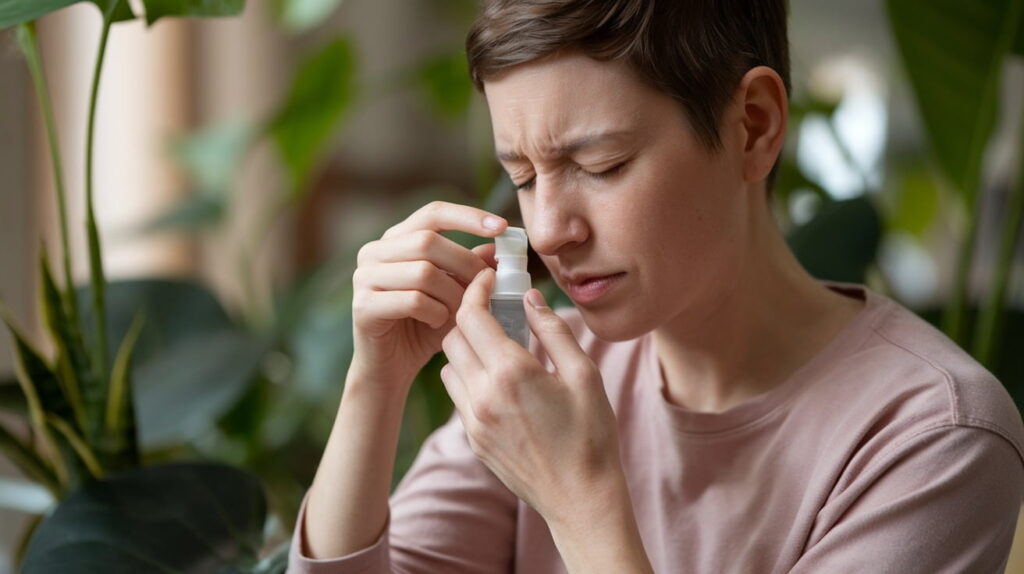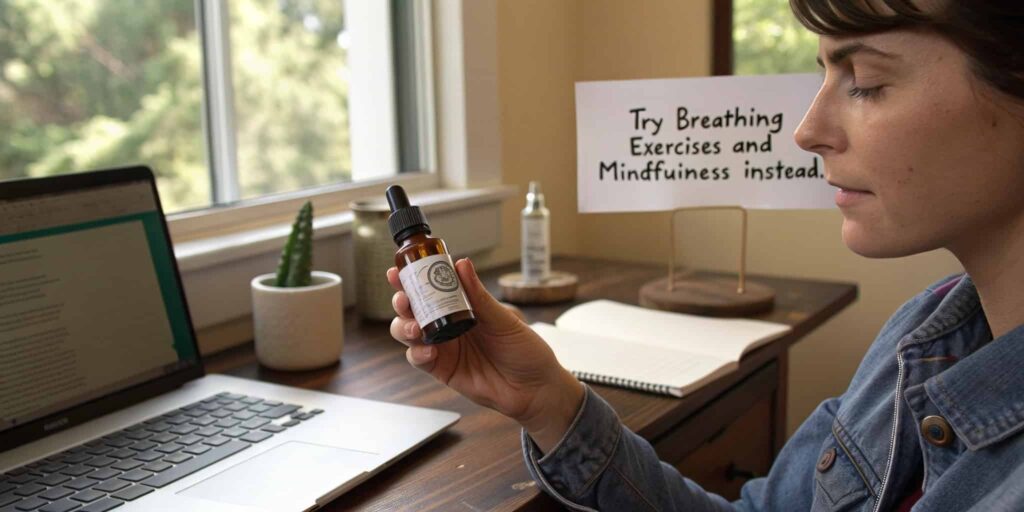Smelling salts, also known as ammonia inhalants, are chemical compounds typically used to revive individuals who have fainted or feel lightheaded. Their main purpose is to stimulate the nervous system and restore consciousness. However, the idea of using smelling salts for anxiety relief has gained attention, despite limited scientific evidence supporting their effectiveness for this purpose.
This article explores the use of smelling salts for anxiety, their potential risks, alternative treatments for anxiety, and other important factors to help you make an informed decision about their use.
What Are Smelling Salts And How Do They Work?
Smelling salts are composed of ammonium carbonate and usually release ammonia gas when exposed to air. When inhaled, the ammonia gas irritates the nasal membranes, causing a reflex that leads to deep inhalation. This process increases oxygen intake, stimulating the sympathetic nervous system, which is responsible for the body’s fight-or-flight response.

The sudden increase in oxygen helps individuals become more alert and focused. In this section, we will explore how they function and why they are effective in certain situations but not necessarily for anxiety.
Can Smelling Salts Help With Anxiety?
The idea behind using smelling salts for anxiety is simple: if these compounds can trigger a burst of alertness in moments of fainting or lightheadedness, why not use them as a quick fix for feelings of anxiety? It is a tempting thought, as many individuals experiencing anxiety seek out fast solutions to combat their overwhelming emotions.
However, there is no solid scientific backing for the idea that smelling salts can address the root causes of anxiety. Unlike prescription medications, therapy, or other well-established methods, smelling salts do not target the underlying mental health conditions. Instead, they provide a temporary and superficial physiological response that is not related to the biochemical processes associated with anxiety.
What It Is And How It Affects The Body?
Anxiety is a mental health disorder characterized by excessive worry, nervousness, or fear. It can manifest in a variety of ways, including constant thoughts of danger or catastrophe, physical symptoms like a racing heart, dizziness, or trembling, and a persistent feeling of unease.
The physiological response that happens when an individual experiences anxiety is different from the reaction produced by smelling salts. Anxiety is tied to the body’s fight-or-flight response, and its effects can be managed with cognitive behavioral therapies (CBT), relaxation techniques, or medication—none of which are linked to the stimulating effects of ammonia.
Potential Risks And Side Effects Of Smelling Salts – Learn The Facts!
While smelling salts might seem like a quick fix, it is important to consider the risks they carry. The chemical compounds in smelling salts can lead to several adverse effects, including:

Nasal And Respiratory Irritation:
The ammonia gas emitted by smelling salts can irritate the sensitive tissues of the nasal passages, causing discomfort and potentially even pain. For individuals with preexisting respiratory conditions like asthma, the fumes can exacerbate symptoms, making it harder to breathe.
Chemical Burns:
Repeated exposure to the strong fumes of smelling salts can cause chemical burns to the nasal passages, skin, or other sensitive areas. These burns can result in long-term damage, especially if smelling salts are used frequently.
Short-Term Relief With No Long-Term Benefits:
While smelling salts may provide a temporary jolt of energy or alertness, they do not address the long-term effects of anxiety. Relying on them as a coping mechanism can prevent individuals from exploring more effective and sustainable solutions for managing anxiety.
Are Smelling Salts Safe For Anxiety Relief?
Using smelling salts for anxiety is not recommended. In fact, it can be harmful. Anxiety is a complex mental health issue that requires more targeted interventions to manage effectively. Smelling salts, on the other hand, are designed for very different purposes, such as reviving someone who has fainted or boosting athletic performance.
Instead of relying on quick fixes, it’s important to focus on methods and treatments that can support long-term mental wellness. Let’s explore some alternative approaches that are proven to help manage anxiety effectively.
Effective Alternatives To Smelling Salts For Anxiety – Safer Solutions That Work!
Rather than turning to potentially harmful methods like smelling salts for anxiety, there are several well-researched techniques and treatments that can provide relief. These alternatives offer sustainable solutions for managing anxiety symptoms without the associated risks.
Cognitive Behavioral Therapy (CBT):
CBT is a widely recognized and effective treatment for anxiety. It involves working with a therapist to identify and change negative thought patterns and behaviors that contribute to anxiety. Through CBT, individuals can learn to reframe their thoughts, reduce worry, and develop coping mechanisms for managing stress.
Mindfulness and Meditation:
Mindfulness practices, such as meditation and deep breathing exercises, can help individuals with anxiety focus on the present moment. By quieting the mind and reducing stress, mindfulness can improve emotional regulation and help individuals manage overwhelming feelings of worry and fear.
Aromatherapy:
Aromatherapy uses essential oils with calming properties to alleviate stress and anxiety. Oils such as lavender, chamomile, and sandalwood have been shown to have soothing effects on the body and mind. Unlike the harsh and potentially harmful fumes of smelling salts, aromatherapy offers a safer, more natural approach to managing anxiety.
Regular Exercise:
Physical activity is one of the most effective ways to manage anxiety. Exercise releases endorphins, which are chemicals in the brain that promote feelings of happiness and reduce stress. Whether it’s a walk in the park, yoga, or a high-intensity workout, staying active can help reduce the symptoms of anxiety over time.
Medication (When Necessary):
In some cases, medication may be prescribed to help manage anxiety. Selective serotonin reuptake inhibitors (SSRIs), benzodiazepines, and other medications can help regulate the chemicals in the brain that contribute to anxiety. However, medication should always be taken under the guidance of a healthcare professional.
Can I Use Smelling Salts To Calm Down Quickly During An Anxiety Attack?
No, using smelling salts to calm down during an anxiety attack is not recommended. While smelling salts can give you a quick burst of alertness, they don’t address the root causes of anxiety. Anxiety attacks are caused by stress or overwhelming feelings, and smelling salts won’t help with those emotional triggers.

In fact, the harsh ammonia fumes could make your symptoms worse by causing irritation to your nose and lungs. Instead, it’s better to try breathing exercises, mindfulness, or other relaxation techniques that help calm your mind and body in a safer, more effective way.
How to Safely Manage Anxiety – Tips And Strategies!
For those looking to manage anxiety in a healthy and sustainable way, here are some tips:
- Practice self-care: Prioritize activities that bring you joy and relaxation, such as spending time with loved ones, reading, or engaging in hobbies.
- Stay connected: Talk to a trusted friend, family member, or therapist when anxiety feels overwhelming.
- Maintain a healthy lifestyle: Eat a balanced diet, stay hydrated, and get enough sleep to support overall mental and physical well-being.
- Stay informed: Learning more about anxiety and its symptoms can help you understand your triggers and manage your emotions more effectively.
Frequently Asked Questions:
Are smelling salts effective for anxiety?
No, there is no scientific evidence supporting the use of smelling salts for anxiety relief. While they can provide a temporary boost in alertness, they do not address the root causes of anxiety. It is important to rely on more effective, researched methods for managing anxiety symptoms.
Can smelling salts be harmful?
Yes, prolonged use of smelling salts can lead to nasal and respiratory irritation, chemical burns, and other health issues. They should not be used as a treatment for anxiety. It’s essential to use them only in emergency situations and under medical guidance.
How can I reduce anxiety naturally?
Practicing mindfulness, engaging in regular exercise, and maintaining a healthy lifestyle are all effective ways to naturally reduce anxiety. These strategies help lower stress levels and improve emotional well-being over time.
Can aromatherapy help with anxiety?
Yes, essential oils such as lavender and chamomile have calming properties and can be used safely to reduce anxiety symptoms. Aromatherapy offers a natural, soothing alternative to harsh treatments like smelling salts.
Is exercise helpful for managing anxiety?
Yes, physical activity releases endorphins, which can improve mood and help alleviate anxiety over time. Regular exercise is one of the most accessible and effective ways to reduce stress and anxiety naturally.
Are there long-term benefits to using smelling salts for anxiety?
No, there are no long-term benefits to using smelling salts for anxiety. They only provide short-term effects and can cause harm with repeated use. Focusing on healthier, sustainable methods is key to managing anxiety in the long run.
What should I do if my anxiety is overwhelming?
If your anxiety is overwhelming, consider speaking with a mental health professional who can guide you through treatments such as therapy, mindfulness practices, or medication if necessary.
Conclusion:
While smelling salts for anxiety might seem like an appealing option for those in search of a quick fix, they are not a safe or effective solution. The potential risks of using smelling salts, including irritation, chemical burns, and respiratory issues, far outweigh any temporary benefit they may provide.
Instead of relying on potentially harmful substances, individuals with anxiety should turn to established, evidence-based treatments such as CBT, mindfulness, aromatherapy, and regular exercise. These methods not only address the underlying causes of anxiety but also offer sustainable ways to manage symptoms and improve overall mental well-being.
Also Read:








Leave a Reply